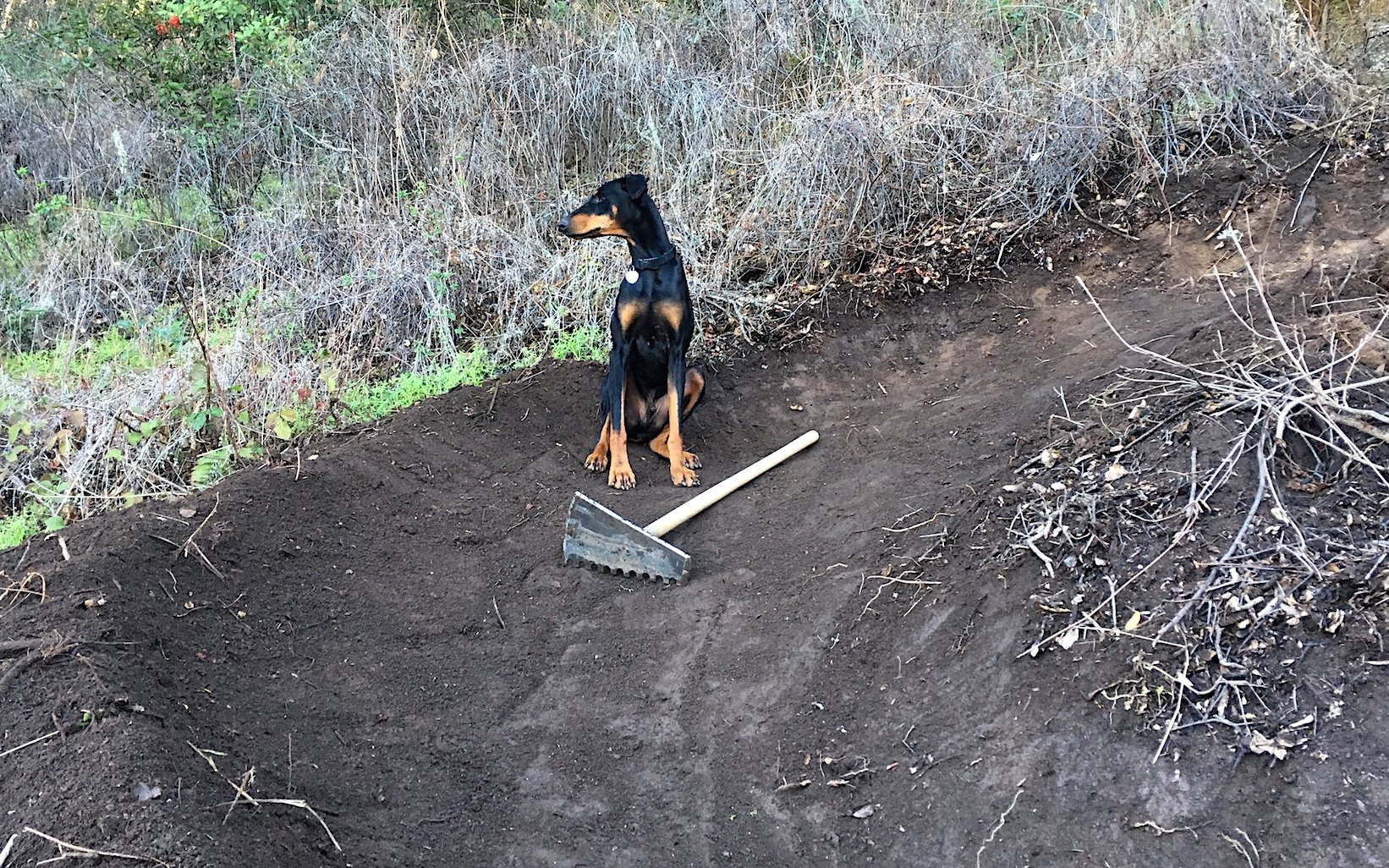
Beggars Would Ride
Leaving Our Mark
There is no way to write this column without it at some point coming across as a bit preachy, and a whole lot hypocritical. And there is no way to read it, I suspect, without feeling a little bit attacked and wanting to shake some sense into me. It might stir up some “Yeah, but…”ism. This is to be expected and is a natural reaction to apocalyptic doomcasting. I am in no way a paragon of virtue here. I consume. I burn fuel. I lust after shiny new things. I am not fixing the planet. But really, when it comes to the planet, who is? Collective willful blindness and eco-hypocrisy notwithstanding, we should still be able to talk about these things, right?
For most of my life, I considered bike riding to be an act of ecological goodness. Every moment I was riding my bike was time that was not being spent driving a car, or squandering electricity on artificial light or heat, or consuming other sources of energy in some other recreational pursuit. I was self-contained and self-powered. In those early days, it wasn’t as if we were building new trails. The trails we rode were already there. The scar in the dirt had been cut by someone else’s hand. And, when weighed against the environmental impact of paving roads, or bulldozing landscapes in anticipation of building housing tracts, or flying around in personal jets, the building of those trails paled into insignificance.
So, away I rode, pretending to save the planet one smug pedal stroke at a time. My hypocrisy would’ve been immediately evident to any self-respecting Lorax. Every weekend I would pile into a car with a few friends and we would drive hundreds of miles to go ride or race somewhere new. We would don synthetic clothing made from the finest petrochemicals. At the races, there would be box vans and team trailers and PA systems and the hum of generators would fill the air. Yeah, but… we were riding bikes, so we were still pretty damn green. Cough.
My parents had me reading The Lorax by the time I was about four, and I first read Silent Spring sometime in junior high. The irony did not escape me for a second that my dad made motorcycle helmets for a living, that our whole house always smelled slightly of gelcoat and Methyl Ethyl Ketone Peroxide as a result of that enterprise, and that my teenage desire to roost every possible surface of the earth from the footpegs of my dirtbike was in direct opposition to the teachings of both Rachel Carson and Dr Seuss. Thus, by the time I ditched the dirt bikes for mountain bikes sometime in the 1980s, I felt like I was undergoing a personal eco-transformation.
Youth is a tough place for words like “hypocrisy” and “compromise.” Youth is where idealism likes to flower. It is fertile soil where absolutism can take root, where hard-edged convictions can flourish without being pruned back by circumspection or reason or collective reality. It’s a great place for all or nothing thinking. Old zealots are less common than young ones. That’s why the young make better soldiers and suicide bombers; they can really get behind a conviction, whether that conviction be clear-cutting forests in the name of “progress” or joining Earth First and tree-squatting.
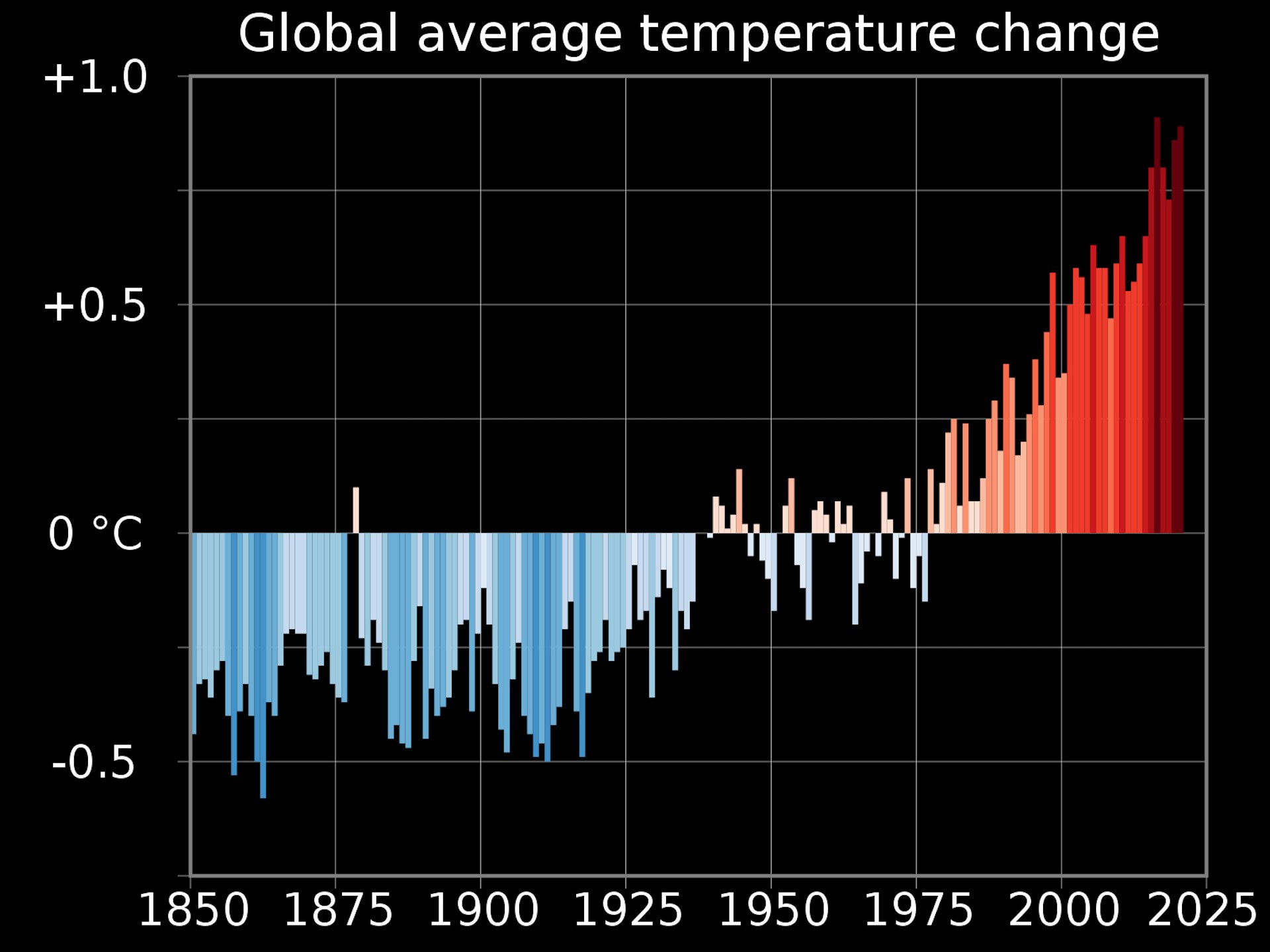
"Dude, check out the lip we're building on the right. Gonna catch some suh-weeeeet air off this graph!"
I’m not so young anymore. And I have grown used to the many, many hypocrisies and compromises that are hardwired into modern life. I can see right through younger convictions, call bullshit on my earlier rationales and justifications, and somehow juggle the complacency of being a modern consumer-citizen with low-grade existential dread and quietly seething class-based rage that now shadows my day-to-day existence. And while I still believe that riding mountain bikes is a (relatively) low-cost, low-impact kind of activity, I harbor no delusion that this thing I do for fun and sanity is a zero-cost game, environmentally speaking. My struggle now, socially and intellectually, is trying not to fixate on what feels like a freight train of consequence barreling down on us all.
Right now, I have four pairs of shoes that I am rotating through a test cycle, all made somewhere in Asia. There are two expensive carbon fiber bicycles also being tested. There’s another carbon fiber bicycle leaning up against the door of my apartment in Loreto, where I just flew along with a couple hundred other jet-fuel huffers. That bike has a spare set of carbon-rim fatty wheels in the spare room. Those bikes and wheels all came from factories in China, started out as some petroleum-derived compound that got refined into plastics and resins, squeezed in molds, baked in ovens, painted with more reconstituted dinosaur juice, wrapped in even more plastic for protection, carefully packed into cardboard boxes, flown or floated across a vast expanse of ocean, and turned into the bicycles that I am now riding. Bicycles, plural.
These bicycles get ridden up north on trails that humans carved out of the dirt, through landscapes where those trails previously did not exist. People drive in cars to trailhead parking lots, ride their bikes, have some fun, then drive home again. The trails themselves cut through topsoil, interrupt mycelium networks, alter animal behaviors, encourage the introduction of non-native and invasive seeds and even at the most considerately built level, represent an element of change. In Mexico, the bike gets ridden through a parched landscape of dust and thorns and fish skeletons and the detritus of human existence that is clearly demarcated by little bits of plastic garbage everywhere.
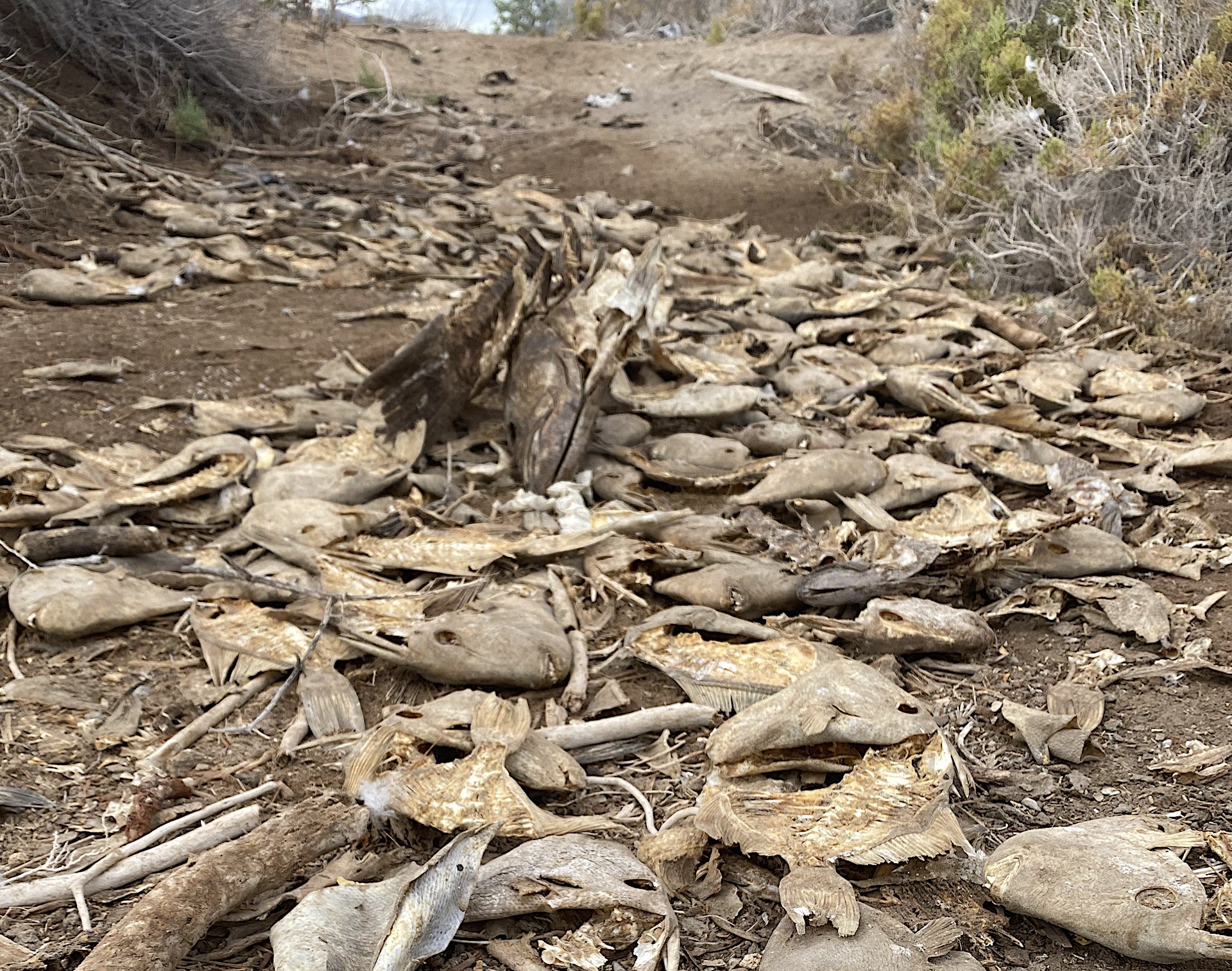
A tasty little slice of Baja singletrack. At least it's organic...
The clam shack at the end of my ride in Loreto just announced that they won’t be serving clams for the next couple years because people have overfished the local clam population and this moratorium is a Hail Mary hope that the clam population might recover. I ate a lot of those clams. I am part of the problem. We are humans. We leave a mark. The more of us that congregate in a given place, the more of a mark we leave.
I do this because I love riding this stuff, and because I write here, on this website, where people want to read about this stuff. Okay, maybe not “this” stuff, but the fun bike stuff. The people who make this stuff, send it to me because they hope I will say good things about the stuff, and that may in turn induce some of you to buy more stuff. This is why we are referred to increasingly as “consumers” instead of “citizens.” I consumed those clams. I consume these bicycles.
This website, meanwhile, would not exist if not for massive server farms humming somewhere over the horizon, usually placed near a convenient source of energy like a hydro-power plant or a coal-fired generator. Because the server farms need a LOT of energy to process all those ones and zeroes. And we down those ones and zeroes like drunks near closing time. By “we”, I mean this website, all the websites like it, all the websites everywhere, and all of you staring at glowing screens reading these words, other words, scrolling through pictures of bikes, crash reels, videos of cats, and TED talks about the interconnectedness of tree roots and mycelium networks.
It should also be observed that this website is something of a meta-sanctuary with regard to consumerism and mountain biking. The readership here does not reflexively cleave to bro-titlement, and we don't spend all our editorial time knob-polishing the newest, shiniest, most consumptive toys just for the sake of the fawning. We talk about cost and consequence. We ask difficult questions of ourselves and others, even if we don't have answers.
There are days when I can almost pretend there isn't any dark writing on the wall, that Everything Is Going To Be Okay, and that we can party on the way we always have, that our children will too, that their children and their children’s children will get to enjoy fresh air, loamy booters and lots of chocolate clams forever. But increasingly, I feel like we are going to be handing down a legacy of cataclysmic violence and an ash-choked end game, and it is going to happen sooner than I want to admit. It won’t be caused by us choosing to play around in the woods on our bikes. But playing around in the woods on our bikes won’t do anything to pump the cosmic brakes on when or how it comes to pass, either.
Ahhhh, lookit me. I’m rambling again. Sort of like The Stranger’s monologue at the end of The Big Lebowski, stuck without an ending. I am brim full of worry, gaseous with judgment, and I have no answers. May as well go for a ride. I will savor every second of it, even the uncomfortable bits. It could always be worse. The dude abides.
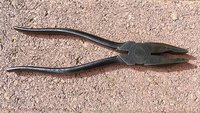









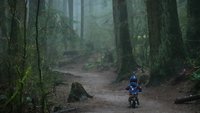
Comments
TristanC
6 months, 3 weeks ago
I've been thinking a lot about this too. I'm of two minds. One says I should live in a shack in the woods and eat homegrown mushrooms and never travel further than I can walk in a couple hours and read library books all day to have the smallest impact on the world that I can.
The other says that I only have one life, and I need to live it to the fullest that I can - within reason. I don't feel a need to rent a helicopter or anything, but I drive a lot to ride my bike, and I buy my fair share of stuff I don't need.
I feel the freight-train-of-consequence thing. Heck, I work for a company that makes parts for mine haul trucks - should I really be condoning tearing holes in the planet for rocks? But it pays well, so I can ride my bike more!
I don't think there is an easy answer.
Reply
fartymarty
6 months, 3 weeks ago
Whilst being a bit right wing there are some good points in https://www.youtube.com/watch?v=zJdqJu-6ZPo&ab_channel=OxfordUnion about finding a good clean fuel that developing countries can use.
Reply
MTB_THETOWN
6 months, 3 weeks ago
There is no answer. If there was, we'd all just do that. Instead it's just an endless balancing act of trying to do the best we can with what we've got, constantly failing, then trying to do better again. Such is life for our imperfect species
Reply
Cooper Quinn
6 months, 3 weeks ago
Take a close look at your own life, using one of the plentiful online CO2 footprint calculators. Figure out what's most impactful that you can change, start there. No one is perfect, but sometimes the biggest changes we can make are a bit hidden.
Then, write every single politician you can, repeatedly, to change our entire energy and transportation system.
Reply
Mark
6 months, 3 weeks ago
Population control and consumption control - those are the two most important things. Consumption control is the easier one to focus on. Re-pair things, re-use things, borrow things and generally avoid the cycle of buy a new thing every time there is some sort of "improvement" and then throwing away the old thing. For that to work we have to demand better from companies/manufacturers.
A good example are two cordless 12V Milwaukee drills I recently tried to repair. The trigger switches were on the fritz and needed to be replaced. Cost for the switch including shipping was $65, partly due to the electronics attached to it. Cost for a similar new drill - $50. I thought about trying to fix the switch but it's sealed unit that can't be fixed. I'll still recycle what I can of the old drills, but it sucks knowing that the drills could have been fixed with a $10 switch if they had been designed just a little bit differently. That's planned obsolescence for you.
Trails and riding aren't all that different.
At the end of the day it's our culture. Western culture is focused on the latest/greatest and everything else is disposable, including people.
Reply
Cooper Quinn
6 months, 3 weeks ago
Eh... unfortunately paring down your consumption on the cordless drill level isn't really going to matter. I mean, its not nothing and circularity and re-use *are* great, but its nothing in to context of the 36,800,000,000 tonnes of CO2 we emitted last year.
The root of the problem is our energy system; most things around us are powered by fossil fuels. Without wholesale, rapid transformation of how we power everything, there's no hope for limiting warming to 1.5, or even 2.0 deg C.
We also need to scale carbon dioxide removal to roughly twice the size of the modern fossil fuel extraction industry to 7Gt/year by 2050, but that's another matter.
Reply
cxfahrer
6 months, 3 weeks ago
The cordless drill level is one end of the scale - it is what everyone everywhere is responsible for. Living in a house (how much CO2 went into building it and heating/cooling?), driving a car (funny how everyone complains about fuel prices, but would never reduce the consumption, unless driving a Tesla, because recharging underway sucks). *
Millions of people reducing their carbon footprint would really help. But would one of them want that - and at what price? Would we live then at the same level as those folks that live in the third world? Or would we all then drive Teslas?
* I am referring here to the unlimited speed on the German Autobahn, all those people just now heading to Italy in their super efficient diesel cars on the left lane at 160kph...
Reply
Cooper Quinn
6 months, 3 weeks ago
Sure, but my point would be there's likely 100 other more impactful places in most people's lives to reduce their footprint than repairing a cordless drill every few years. Yes, you can say its just a symbol or whatever, and you're not wrong and circularity and reducing consumption is very important. But things like driving and flying are... way, way, way worse.
Also, fuel prices are VERY directly linked to total vehicle miles traveled, and the types of new cars people buy. This is why "carbon taxes" work.
And no, certainly buying 2.5 tonnes of metal to drive around in is not the answer - that's right back to 'consumption'. ;)
And also no, we don't have to regress back to some third world vision of society. We just need to make meaningful changes incredibly fast, and hold governments accountable.
Reply
Mark
6 months, 3 weeks ago
Cooper, don't get too hung up on the explicit example of the drill. It's there to serve as an analogy of our attitude towards consumption.
Reply
Cooper Quinn
6 months, 3 weeks ago
"Yes, you can say its just a symbol or whatever, and you're not wrong"
Mark
6 months, 3 weeks ago
It's not going to matter because it's not the prevailing attitude. IF people's attitudes towards consumption were different then all other things would flow from that. However, because the bulk of the population doesn't give a damn about waste and there's more profit to be made in producing goods with a limited lifespan that aren't worth repairing due to the cost (home appliances anyone?) we get the situation that we have now. Whether it's cars, computers, phones or bikes, people are eager to buy the new and get rid of the old, with no thought as to what happens when the old gets thrown out. We've turned the planet into a toxic waste dump because of that attitude.
Reply
fartymarty
6 months, 3 weeks ago
Maybe companies should be responsible for the full life of the products they make...
Reply
Cooper Quinn
6 months, 3 weeks ago
1) yes
but
2) consumers aren't willing to bear that cost.
Reply
Mark
6 months, 3 weeks ago
Which is why attitudes about consumption need to change. :)
Cooper Quinn
6 months, 3 weeks ago
Change the price, you'll change consumption habits.
See: gasoline carbon taxes.
Mark
6 months, 3 weeks ago
Increasing prices don't seem to be having enough affect in relation to how much we need to reduce our usage of fossil fuels.
https://www.theglobaleconomy.com/Canada/gasoline_consumption/
Cooper Quinn
6 months, 3 weeks ago
There's a well studied inverse relationship between cost of gasoline and VMTs.
Mark
6 months, 3 weeks ago
Cooper I'm not saying or doubting that fuel pricing doesn't have an effect - but questioning whether it's having enough of an affect right now. Consumption seems to indicate that the increase in fuel prices have not had a significant impact on fuel usage. While that page doesn't correlate the population increase of about 4mil since 2015, when one considers the economic status of most of that group I don't enough of them being drivers to say with confidence that our driving habits are changing fast enough.
Now if the fuel tax was to go up another $2 over the course of a 1yr period you probably would see a sharp decline in the use ICE vehicles, but I don't see any govt's on the horizon who would be willing to go down that path.
At the end of the day it's an ideological battle, whether that's achieved with policy changes, behviour changes or a combination of the two. I currently do not have confidence that the prevailing ideology will change fast enough to achieve the type of emissions reductions that we need. When you factor in the billions of people in the emerging economies of Asia and the number who will want the luxuries of the "Western" lifestyle too, the future becomes a bit more bleak.
I don't think that means we give up, but a LOT of attitudes have to shift if significant progress is going to be made.
As for why I am concerned? I don't have kids and will probably be dead before shit really hits the fan, but I find it gross that we are essentially shitting in our food bowl. What I can see is that maybe in another 10-15 year riding on the Shore may be affected enough that we have summer closures due to fire threat or trail damage from things being dry for too long. Or heaven forbid, the Shore burns down.
We both want the same thing here, I just feel that not enough attention is being put towards the psychology aspect so we can change behaviour.
Cheers!
Evan Littauer
6 months, 3 weeks ago
Long time lurker - made an account to comment on this as it really struck a cord with me.
Biking, like many mountain/gravity oriented sports is really carbon intensive. There isn't any way around it. As you've mentioned, the gear and the travel and the ecological impact of the sport really seems to add up. It's really hard to remove yourself from that focus because it's so in your face. It's present, and not abstract, and really easy to directly look at your personal impacts every time you fill up the car, or throw that plastic wrap into the garbage.
But that mindset doesn't have to stay that way.
Tackling the climate crisis needs to be done from both a top-down and a bottom-up approach, everything is connected. The largest contributors to our changing climate is the large corporations who are only sticking within the rules (or lack thereof) that they are given. Policy drives change, and policy is dictated by your government. The biggest impact of trying to live an eco-conscious lifestyle isn't the reduction of your carbon footprint (which was a marketing campaign by BP), it's the influence that you have on your immediate social circles. Those conversations that get started from lifestyle changes, like the "why did you ride your bike to work in the rain today?" or "why did you bother repairing that item instead of buying another jacket?", they get the gears turning more than facts and figures ever could.
I'm not saying ignore the news and try to live in blissful ignorance, but rather have the main focus of your attention on finding opportunities to talk about the issues you care about and getting people in your life to care about those issues too. Gotta keep things positive.
Reply
Timer
6 months, 2 weeks ago
Good points. Yes, biking can be quite bad in terms of carbon emissions. Especially the travel that sometimes goes with it. I'm quite appalled whenever I encounter bikers in the Alps who flew there from half over the world. Often from areas which are themselves great locations for riding. Why?
But bikers also often commute by bike rather than car. Which is a good thing and has a chance to start change by example.
Maybe not so much in North America, where they built their towns and cities to be really hostile to anything that isn't a car.
Reply
Velocipedestrian
6 months, 1 week ago
>Biking, like many mountain/gravity oriented sports is really carbon intensive.
While I generally agree, there are choices we all make. Most of my bike purchases are second hand, and I'm mostly on the Ride To The Ride programme, I keep bikes for a long time, etc...
Just because the marketed image is all tailgate parties, international travel and new carbon everything doesn't mean we have to choose that.
Reply
Andy Eunson
6 months, 3 weeks ago
I was thinking about similar things this morning. Pinion have the latest and greatest electric gearbox integrated with a motor driving a belt. It’s not the thing itself but the marketing of more stuff that I take issue with. I saw a used 2009 Ford Ranger for sale for about $10k this morning. I was thinking that was about the last of the reasonable sized and fitted trucks. Trucks today seem to about how much plush can you stand. Carpets, leather, electric this nd that, flashing lights, beep fucking beep. It’s the consumerism and the constant push for growth that I despise. Economic growth is based upon selling more goods and services to more people. It drives population growth which is the driving force behind all environmental issues. Few people seem to understand this. I sense that some people are starting to think this way though. I am hopeful for the future I’ll never see. People like Mr Ferrentino make us think a bit more critically for ourselves. Don’t let the marketers do the critical thinking for you. Drive that car, ride that bike until it costs more to fix then it’s worth.
Reply
taprider
6 months, 3 weeks ago
"In those early days, it wasn’t as if we were building new trails. The trails we rode were already there"
The first race course trails I designed/"built", I was limited by the Land Managers and the Forester to existing trails, which I interpreted to include game trails (deer tracks). The trails worked to give an advantage to pure mountain bikers over the roadies for the XC race (the time gained on the trails more than made up for the time lost on the gravel climbs) and the DH race was technically challenging so that riders with higher levels of skill did better than those that just had no fear, and the day after the races and a heavy rain, the trails looked the same as before the races (enough needle duff had fallen).
However, when the downhill trail was used for a Canada Cup, the DH racers complained that the trail was not suitable (too janky as they would say now) for their ski-resort-dedicated DH bikes (they even complained they had to truck shuttle rather than riding a chairlift). The following year, the DHers got their wish and built the trail they wanted. It rained hard between training and race days, and the steeper half of the mountain could not be used, and even then the straight down the fall-line sections became eroded trenches; whereas, the old retained sections still looked good.
It seems each year our existing trails are being modified to suit newer and newer bike technologies. Bigger Faster Higher results in higher levels of soil and vegetation displacement; whereas, more naturally appearing (minimal construction) trails can be designed and routed to allow for multiple user groups and higher usership, while retaining technical challenge (natural speed bumps) such that a skillful rider on an old school bike would still be faster than an average "flow" rider on an e-bike.
Reply
Pete Roggeman
6 months, 3 weeks ago
I was already struck by the monstrosity that is Eurobike, but this drives home a very salient point. A nice piece of perspective to carry into the show floor today. Thanks, Mike.
Reply
JT
6 months, 3 weeks ago
Nothing is without consequence. Whenever I find myself reeling under the quote from Vonnegut's A Man Without a Country, “We could have saved it but we were too damned cheap,” I use it as a reminder to get out into the woods on foot or saddle, with spouse, pup, or no one at all and watch what bits I can. The spouse may give a chuckle and eyeroll at my purchasing decisions, but the pup only cares about being out there, smelling the smells, playing with other pups, and chasing all the fuzz butt critters she comes across. A reminder to be here, now.
The consequence of that is I feel better for a bit, even if I find myself ruminating on that quote or the out of context lyric from Night of the Hunted, "I fear for your outcome, I fear for mine, too, We're in deep together, baby, We're screwed."
Reply
Cam McRae
6 months, 3 weeks ago
I was listening to CBC radio yesterday and there was a discussion related to something Bill Nye said: “the biggest thing you can do for the climate crisis is vote.”
This was discussed by academics in the field and they all agreed. The best part is this is one of the few areas where municipal and state/provincial voting can make a real difference.
If the planet is important to you, choose your candidates carefully.
Reply
Cooper Quinn
6 months, 3 weeks ago
Yep.
Reply
Dave Smith
6 months, 3 weeks ago
Yes.
Reply
gregster77
6 months, 2 weeks ago
That sounds good, but realistically C02 and global warming will be decided by powers that are not in Canada. Global impact wise, we don't get a say with what happens with our ~2% contribution. Unless we start restricting imports based on environmental impact?
If anything, the powers that do get a say are the ones working to impact our votes for candidates they favour.
What's frustrating voting-wise at least federally is that it seems you have to choose between utter fiscal incompetence or environmental indifference.
Not saying we shouldn't act to do our best still, so still very much ON BOARD with the theme here.
I think we should be careful with the "carbon taxes are the answer". Everything has impact, and they're also economically damaging. Jobs and manufacturing go even more so to the places that don't have it. Cost of living goes up. People still need to get places. Fuel efficiency standards also work. Carbon taxes are more about revenue than environment now. Just remember, when we all go electric, the government will have to reach deeper in your pocket to continue to get its cut. This is just an easier tax to sell than income taxes.
Much has been said about idealism, so I will just say - once you get to the economic growth level of Venezuela, concern for environment falls off rapidly.
Agreed that population growth, the ponzi scheme that is all our social security which requires infinite growth... all are problematic and we should not give up discussing and searching for solutions.
I get that many want radical changes, but places like China won't make that happen, and what we do will be offset buy what they do. I remember when I first got to Mumbai, I thought there was a tire factory on fire, but no, that was just every day pollution...
Of course what's "radical" will vary from person to person. Like driving, anyone going slower than me is a moron and anyone driving faster than me is a maniac. :)
I do agree it won't be a single answer, but a combination.
Maybe nuclear isn't the best idea along the ring of fire regions.
Reply
Timer
6 months, 2 weeks ago
I think it's a fallacy and a cheap cop out to just claim that one's own country is too small to affect global warming. It's the same fallacy as "my vote doesn't matter". It does!
Especially in industrialized nations. Our countries determine the technological path of the world. If we mass adopt renewable energy, good public transit, environmentaly conscious packaging, long lasting, repairable goods, emerging countries will follow us.
That has happened before. We invested a lot of R&D into developing and efficiency making solar panels and wind turbines. And look what's happening: China is building tons and tons of renewable power because it's the most efficient way. Same goes for high speed rail.
Reply
Maximum Radness
6 months, 3 weeks ago
You know those shirts and stickers that say “listen to bob Marley”? Then a bunch of skaters made the ones that say “listen to slayer”….
I’d like to have one that says
“Read Ferrentino”
This life is a blessing.
But the challenges are the blessing, the point, and the way we find the meaning. Sure hope we don’t kill our selves off on that big jump we built…..
Reply
hankthespacecowboy
6 months, 2 weeks ago
Working in the fracking boom of Western Colorado in the early 00's gave me a new appreciation for the nuances encased in the self-descriptively titled "extractive industry." At the same time, it opened my eyes to the vastness of public land.
Becoming a trail builder allowed me to use the skills I had accumulated to work in a way that felt far more rewarding. The longer I spend walking through relatively undisturbed areas planning new trails, the more I realize how much our own form of recreation displaces various patterns of the ecosystem that have been evolving for thousands of years. Yet what are the consequences of unguided, un-restrained recreation on the landscape?
It still leads back to the a mindset conditioned to consumption, and an incomplete understanding of how our actions influence the world around us.
Thanks, Mike, and the commenters on this site for having this discussion.
Reply
Mammal
6 months, 3 weeks ago
I feel this on a regular basis. It may sound extreme, and there are several other factors that pointed us this way, but this is one of the reasons my spouse and I have decided not to have kids. I honestly don't have any confidence in the human ability to manage ourselves, and it feels like the clock is ticking faster all the time.
Reply
Velocipedestrian
6 months, 3 weeks ago
The Selfish Act.
It's a grim scene, but it's helped me drop the 'why don't you want to have kids?' attitude that seems to come with being a parent.
Reply
taprider
6 months, 3 weeks ago
Holy Shit, that video is powerful
Reply
Velocipedestrian
6 months, 3 weeks ago
It's a creepy series.
Reply
tashi
6 months, 3 weeks ago
Great piece, and it’s very appropriate how it lacks a satisfying conclusion or prescription for turning things around, because there ain’t one.
Reply
Mike Ferrentino
6 months, 2 weeks ago
I wish I could see the way to a satisfying conclusion on this one. Someone upthread said something about "old man yells at clouds" and it is very apt. That is what it feels like I am doing, like many of us are doing. Thanks for letting me vent.
Reply
tashi
6 months, 2 weeks ago
On a larger, “save the planet” scale there is no satisfying conclusion because we’ll go extinct, just like virtually every other species has and the planet will keep on keeping on. I got a lot less stressed about it when I learned just how insignificant we and the rest of the planets life forms are relative to even just the history of life on this planet, which is pretty damn short.
Of course we don’t really experience things on that scale so maybe we need to look at how our choices affect US. I think that since us rich humans consume so many resources our choices actually can make a difference on a local (spatially and temporally) scale and so these little choices rich fuckers like us make like how many fancy toys we own or how they’re built or how we get around can make a difference for a little while, improving our lives and the lives of our offspring, but I think it’s important to avoid the hubris involved with thinking that we can “save” the planet.
Reply
Mark
6 months, 2 weeks ago
Agree but disagree. For thousands of years many Indigenous peoples managed to live in much greater harmony with nature than what we are currently doing. Sure they didn't have some of the luxuries that we all take for granted, but there was far more emphasis place on considering one's affect on the environment.
"For Indigenous peoples, our pasts, presents, and futures involve living and being in reciprocal, consensual, and sustainable relations with the natural world, which includes human relationships to each other as well as with lands, waters, landscapes, atmospheres, and plant and animal nations (for brevity, we will collectively describe this network, imperfectly, with the English word “lands”). In this testimony, we imagine a world that fosters stronger human relationships with each other and with the land—the world that we need. To do so, we must first address the challenging contemporary global and national contexts we find ourselves in and understand the paradigms that have led us here."
https://humansandnature.org/restoring-indigenous-systems-of-relationality/
Reply
tashi
6 months, 2 weeks ago
And their populations were tiny.
What point are you disagreeing with?
I can’t seem to respond to you post so I’ll do it here in an edit.
How people see themselves and how sustainable their lifestyles are is not the same thing. Indigenous peoples are not homogenous and there are plenty of examples of massive amounts of waste occurring when resources are abundant, and plenty of examples of folks reading the land when resources are tight, like every other group of humans.
The context I’m referring to is both relative to the carrying capacity of the land (for wealthy populations such as coastal peoples) and relative to current population levels.
This leads into the real heart of the issue: for our current resource needs, we have too many people. Our planet can’t sustain us. We’ll ultimately either have a massive population crash or go extinct, just like every other life form. Our population graph over time is no different than any other organism. The planet will carry on, forever altered, but still supporting life. To me it is the height of hubris to think that we can somehow outfox this fundamental energy problem when no species has ever done so and we’ve shown no capacity of being able to do so, and downright arrogant to believe that it matters to anyone but ourselves.
We can’t save the world, and we’re not even trying to. We need to stop arrogantly conflating things, we’re trying to save OURSELVES. (While hopefully keeping our lifestyles intact)
Reply
Mark
6 months, 2 weeks ago
Re tiny populations, it depends on what context you want to put populations into.
The point is that they chose to live with nature and saw themselves as stewards of nature instead of masters of nature where it is primarily a resource to be exploited used for our immediate benefit ($$$) like our society currently does. These are two vastly different views of the world.
What I am disagreeing with is the idea that we can't save the world. Thinking we can't means we won't, but thinking we can at least presents us with the opportunity to do so.
Curveball
6 months ago
That's really it. We learned to conserve energy and resources in the 1970s and then threw all that away. Now, I would bet that change will be forced on us rather than us making better decisions. I'm pretty sure that it's much too late to put the ship on a different course and only those closest to the lifeboats will make it. Not to mention that those lifeboats will be much less comfortable quarters than the cruiseliner that we're currently on.
Reply
Maximum Radness
6 months, 2 weeks ago
Isn’t this just a lovely exposition of the combined perspectives of fear and projection. Thing is, mt biking was never saving the world but I sure bet it saved a few hearts, souls, and minds. But mt. Biking wasn’t tearing the rainforest down either. We live in complex system, that’s become dominated by a corporate / capitalist economic machine. That’s simple. But what isn’t simple is that working within those confines, and only working together- is gonna unhinge the cataclysm that we’ve built for ourselves as a global consumptive species group. I hope it works out. I’m teaching my kids to be engineers, and thinkers, becasue it’s gonna take a lot of brains from the next generation , to work this out . I feel guilt and pity and remorse and sadness for all of humankind’s mistakes, but mistakes are a crucial part of all life paths …..
Really hope we don’t go out like this.
Kinda deserve it tho.
Maybe the next go will sort this stuff out.
And by all means; we should be rocking out in the free world, and looking towards any and all solutions.
It’s too bad we can’t go backwards,
But maybe it’s for the better that we need to move forwards very quickly and effectively as well.
As a mountain biker by definition, lifestyle, and spiritual ethos: I have to tell you guys and gals that I appreciate that we can hold this space for these thoughts publicly like this. Server farms be damned!
Reply
Adrian Bostock
6 months, 3 weeks ago
“I can see right through younger convictions, call bullshit on my earlier rationales and justifications, and somehow juggle the complacency of being a modern consumer-citizen with low-grade existential dread and quietly seething class-based rage that now shadows my day-to-day existence.”
We as a society are facing so many threats and seemingly insurmountable obstacles that If your not feeling this you must think you can ride out the future in a bubble.
I work in the world of planning, constructing and maintaining authorized recreation features. We as an organization do a lot of navel gazing about our impact, both physically and culturally. The mechanism for the management of recreation on public land is overwhelmed to the point of being irrelevant to what is actually happening. There is a whole lot of expectations that some one should do something and that something is always catered to specific individual wants and based on the assumption that individually we have no impact on the environment. just times that by 8 billion.
If you want to add to your existential dread, here is a rabbit hole to do down. we don’t have the energy or minerals to keep on out current path.
https://open.spotify.com/episode/5rDzVHIgheRxk4NR0kr3Ve?si=uERQ7V-RS8O2r68OmVpMVw&context=spotify%3Ashow%3A0ZFJIjuJwh3XeMqrguiXNR
Reply
mikesee
6 months, 3 weeks ago
Bravo Miguel. Just for putting it all out there with some clear-eyed perspective.
Reply
Vik Banerjee
6 months, 3 weeks ago
Here is a climate footprint calculator --> https://climatehero.me/calculate/
Happily for cyclists a human power bicycle is a really low carbon way to get around and recreate. Assuming you don't drive or fly it a bunch for that purpose.
Reply
Cooper Quinn
6 months, 3 weeks ago
It may very well be THE best way to get around! I mean obviously you can't replace every trip with cycling, but we sure could replace a lot...
Reply
Timer
6 months, 2 weeks ago
And assuming you don't buy a new carbon bike every other season...
Reply
XXX_er
6 months, 3 weeks ago
WAY back in the day the big suzook noticed the bacteria in a petri dish multiplied big time and he became a raving environmentalist,
I don't see any way out of where we are headed and neither did he
Reply
Jerry Willows
6 months, 3 weeks ago
but driving my Tesla will save the planet! Too bad we are going need way more Site C dams with all the heat pumps , EV's and if the trucking industry/ships/aircraft want to go electric:
https://ca.finance.yahoo.com/news/b-c-hydro-set-launch-213954159.html
Nuclear is the way for green energy if carbon capturing isn't going to work.
https://www.energy.gov/ne/articles/3-innovations-transforming-nuclear-industry
Reply
Cooper Quinn
6 months, 3 weeks ago
Even if we went 100% netzero today, there' 2,500,000,000,000 tonnes of CO2 in the atmosphere that wasn't there before the industrial revolution.
We need to go net zero, but also need carbon removal.
Reply
Jerry Willows
6 months, 3 weeks ago
Plants soak up CO2 but not sure how long it would it take to get to "normal" levels if we went to net zero which will never happen so we need to look at actual viable forms of energy.
Reply
Cooper Quinn
6 months, 3 weeks ago
We can, and should, do more new nuclear. And solar. And hydro. And geothermal.
We can, and should, plant more trees, wetland restoration, and nature based solutions. These solutions are very valuable for a myriad of reasons, but they're also fairly slow, and limited.
We also absolutely have to do more technology based solutions for carbon, capture, utilization, and storage and carbon dioxide removal. This is the only path to net zero, and eventually real zero. (This is what I do for a living...)
Reply
Mark
6 months, 3 weeks ago
So how to make those things happen? Even if we have the tech working, if people aren't invested in taking advantage of them because the "cool" image is the big V8 gas vehicle then we're not getting ahead. We can turn to the solution of legislation and forced adoption, but people don't like those things and there are more than enough people against green ideology that trying to make that happen could result in societal havoc. IMHO the psychology component gets left out of the discussion way too often. How do we get people who don't believe in the concept of climate change to come around to the idea that it is in their better interests to get on board with the attitude of minimizing unnecessary consumption as well as choosing the lower polluting options during the necessary times.
Re your other point, "yes but flying driving are worse.." is true, but this all stems from the same attitude/philosophy/psychology. People are either invested enough to take steps to minimize their emission/waste output or they aren't and right now far more people aren't invested than are. Unless there is a societal shift in thinking where being green is seen as cool or normal behaviour, clean tech may not be enough to save us.
Mike Ferrentino
6 months, 3 weeks ago
In addition to diversification of energy and implementation of clean energy, we can, and should, do what we can to consume less energy. A LOT less energy. But this is also where shit gets messy, because we are all in some way addicted to the convenience and ease of consumption. Especially in the US.
Almost everyone I know is convinced that they need 10,000 pounds of towing capacity and a big V8. Even if they don't do much more than commute to work, drop the kids at school and go camping once in a while. They don't want to shift to electric vehicles until they can get at least 500hp AND 500 miles of range. They want more and bigger, and they have been trained to expect that (I know, I'm speaking in vehicle specific generalizations here, but bear with me). They don't trust LED lights. They think mini-split heat pumps are a communist plot. Meanwhile, the conspiracist in me is convinced that our society (in the US specifically) has been trained to want that more and bigger "convenience", because that is one of the ways to perpetuate economic growth. In the US we have an entire societal existence based upon continued economic growth. The population must grow, the economy must grow, because consumption must continue, and must accelerate. Any voice that cautions against that growth at all costs mentality is seen as anti-American.
Somehow, we need to buck this entire system. The stock market needs to take a flying fuck. The rich need to start paying some taxes. Restraint needs to be made sexy, instead of excess.
Carbon offset is a start, but to the point of carbon removal, there is such a long way to go. Our entire global economy is based upon resource extraction and valuation (hey, gold standard. hey, oil barrel), when really, we are at the point where the global economy should be based around planetary remediation. Instead of tying our currencies to pollutants and economic growth mandates, tie them to tonnes of CO2 removed from the atmosphere, or hectares of trees planted, or species habitat restored, or minimization of carbon footprint per capita - a financially incentivized anti-GDP that rewards restraint and ethics.
Only problem with that is the people with all the power on the planet (and all the guns) have too much invested in the current death spiral to let go, even though it will ultimately end the game for all of us. There's not a powerful enough incentive/punitive measure to get them to abandon their generational extraction/pollution based wealth in this lifetime. Which, ultimately, means there's really only one thing left to do:
Eat The Rich.
Cooper Quinn
6 months, 3 weeks ago
"So how to make those things happen?"
Enact policy.
Mike Ferrentino
6 months, 3 weeks ago
"Enact policy"
Isn't that just another way of saying "eat the rich"?
Mark
6 months, 3 weeks ago
We can't enact policy unless politicians are willing to put it forwards and that won't happen fast enough as long as a large enough percentage of the population is opposed. Governments are not keen to enact policy that will result in a lot of hate. With populations in NA so evenly split along the left and right it's going to be difficult to get anything meaningful done. This is the crux of the issue (imo) that I've been hammering at - too many people are not on board with the ideas of reducing our consumption, waste and reliance on fossil fuels because it will significantly alter the lifestyle they have become accustomed too. That is the primary "battle" that needs to be fought.
Adrian Bostock
6 months, 3 weeks ago
Kill the Poor
Cooper Quinn
6 months, 3 weeks ago
@adrian
https://www.youtube.com/watch?v=I-8skzQCH0c
fartymarty
6 months, 3 weeks ago
Capitalism and Environmentalism don't play well together. Something has to give - at the moment it's the environment but that may flip once things get to a point and by that time it will be too late.
Timer
6 months, 2 weeks ago
As far as I know, nuclear power nowadays is a lot more expensive than wind and solar. The globally available supply of suitable uranium is also quite limited.
This is more a niche solution for places which can't do wind and solar well.
Regarding carbon storage: One of the more efficient ways to make carbon sinks is to build long lasting wooden buildings. Really long lasting. Which excludes most North American and Japanese residential buildings.
Jerry Willows
6 months, 2 weeks ago
Appears we have lots of uranium:
https://nuclearinnovationalliance.org/index.php/uranium-supply-not-significant-constraint-using-nuclear-energy-climate-mitigation#:~:text=While%20uranium%20is%20not%20a,the%2021st%20century%20and%20beyond.&text=As%20the%20heaviest%20element%20found,explosions%20that%20occurred%20long%20ago.
Interesting read on solar:
http://grisanik.com/blog/how-much-would-it-cost-to-replace-all-energy-sources-with-solar/
Curveball
6 months ago
Here's a question; is nuclear economic to do? If not, then it's off the table.
Lynx .
6 months, 2 weeks ago
Mike, as usual, the comments section has blown up, only managed to read a few, will have to get back later and read the rest, but just wanted to leave a quick comment. Another great piece, had me a tad worried reading the preface/trigger warning/foreshadowing paragraph, but wasn't needed, not in the least, not if you're an honest person with yourself.
Agree with the rest on the whole consumerism thing, yes it provides jobs, but honestly, if we stopped wanting all this new stuff, would we need to be working as much or several jobs, wouldn't it better to just fix the old shit when it breaks or be happy with what we have?
I know that while I do try my best, which I know is a lot harder than a lot I've still got my fair share of guilt/blame to deal with, but I'm OK with that because I know that I actually DO make an effort to not consume un-necessarily, my "newest" bike is from 2018 and I expect to be riding that until I croak, as do I my 2014 and 2012 bikes and I can't recall the last time I bought an article of clothing, most of my stuff is 10+ years old, my brother sadly gained some size and I was the beneficiary of his now too small clothes a few years ago, so I'm good for another 5-10 years again - I don't give a flying fvck about style/fashion or what's the latest trend, I just want to be comfortable and not nude, that's it.
As to driving to the trailhead/ride start, that's something I've been "against" almost since I started MTBing nearly 20 years ago, I try to ride to any ride I'm joining or straight out from my front door if solo, on a rare occasion I'll bum a lift with someone close to me to a ride further afield, but mostly I'll just miss out on those, for now until the fitness and ability to afford to do longer rides improves and I'm not all that bummed about that, because thankfully I was raised to understand and know, that not everyone can do everything or what others are doing just because we would like to.
Reply
XXX_er
6 months, 3 weeks ago
Up here the trails are custom designed mostly machine ( burning diesel) built with govy grants, paid builders, better drainage better everything and no pesky work required which is all awesume, of course if one thinks criticaly we don't need any of this
Reply
Dave Smith
6 months, 2 weeks ago
Just pausing for a moment to appreciate the level of discussion.
Reply
LAT
6 months, 2 weeks ago
carbon tax seems like a cop out policy. why is it possible to manufacture, sell or buy an unnecessarily huge vehicle with an engine to match that is then used as family transport?
i think the answer is, because it is easier for a government to put the responsibility on the consumer than it is to deal with the producers.
i really don’t think individuals are the people best placed to make the necessary changes, we need to be led.
Reply
Bikes
6 months, 2 weeks ago
Another way to think of a carbon tax, it that it is universal to all carbon sources, regardless of end product (assuming no workarounds, which I have my doubts).
Tax something and people will generally used less of it, but general market forces will prevail.
Have the government pick the product, and you’ll get weird distortions (kind of like fuel economy standards resulted in us have large less efficient trucks and suvs). Should they have just taxed gas, it would have been generally universal and people would have move to smaller more efficient cars on average
Reply
BadNudes
6 months ago
That's capitalism for ya. Sell it all for as much money as possible until literally every thing of value on the planet is vaporized.
I really don't see a clear way out without complete changes to all socio-economic systems globally. Policy, education, etc. can make baby steps, but as long as we allow (encourage) greedy millionaires to become billionaires, we are in trouble. Given we are about 2 minutes to midnight, I'm not holding my breath. We're on track to experience consequence like never before.
But as long as I have a bike and can breathe the air outside I can at least feel some joy while the world crumbles.
f*ck, it's depressing.
Reply
fartymarty
6 months, 3 weeks ago
Mike - don't worry too much as were doomed anyway https://open.spotify.com/episode/4xVz9V5DksIPqrdArBPDcb?si=2_9iD9tDQgOzR9nEG1vg9g&nd=1.
Or maybe this is just doubling down on the fear / anxiety.
Reply
mnihiser
6 months, 3 weeks ago
I saw a story on CNN recently. Survey of major corporations' CEOs- 58% felt that AI could lead to destruction of human existence within 5-10 years. I hope proper controls are being put into place.
Reply
Jerry Willows
6 months, 3 weeks ago
CEO's can barely function their iPhone... the survey should be done with CTO's or people actually in the field. AI is tool and should be embraced imo.
Reply
XXX_er
6 months, 3 weeks ago
I wouldn't let that happen Dave
Reply
taprider
6 months, 3 weeks ago
HAL?
Reply
XXX_er
6 months, 3 weeks ago
thats right Dave, that XXX guy was just a lazy beerswilling boomer
Reply
taprider
6 months, 3 weeks ago
so which thing are you not allowing to happen?
XXX_er
6 months, 3 weeks ago
all I do is ride e-bikes and drink IPA
but that was a great setup for an Ai joke
Reply
mnihiser
6 months, 3 weeks ago
Yesterday this story was all over the news here. In the county where I live a company is building a large solar "farm" and now the neighbors are up in arms. " A farm has cows but this one doesn't!" They are strongly opposed to this operation and other counties in the region are jumping on the bandwagon and passing laws which ban future building of solar farms. I think a large chunk of our population here in the USA still thinks climate change is a hoax. Combine that with selfishness being at an all-time high and it appears we are well and truly screwed. Guess I should just "keep on rockin' in the free world" and quit thinking about it.
Reply
Ceecee
6 months, 2 weeks ago
Held v Montana
Let the C-suite, junior suite, and elite pit decarbonizations begin
Reply
Mark
5 months, 2 weeks ago
A few pretty tasty reads for anyone who cares about our consumption cycle
1. The "Crapification" of the U.S. Economy Is Now Complete
https://www.oftwominds.com/blogfeb22/crapification2-22.html
2. Stainless Steal
https://www.oftwominds.com/blogfeb23/stainless-steal2-23.html
3. It's Mourning In America
https://www.zerohedge.com/personal-finance/its-mourning-america
Reply
Roxtar
2 months, 2 weeks ago
I take comfort in that
but...
"You said it man, nobody fucks with the Jesus"
Reply
Please log in to leave a comment.